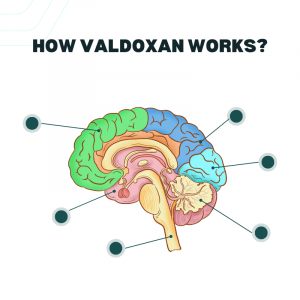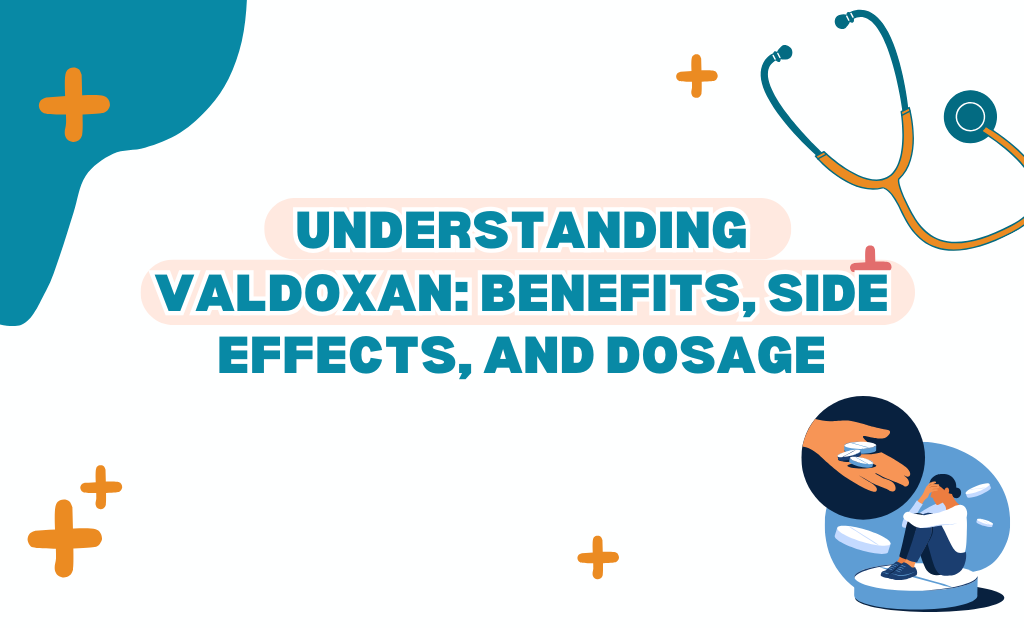Valdoxan (agomelatine) is a unique antidepressant that primarily targets the melatonin receptors in the brain. It helps regulate the sleep-wake cycle (circadian rhythm), which is often disrupted in people with depression. Unlike many other antidepressants and sleep medications, Valdoxan does not directly affect serotonin, dopamine, or norepinephrine levels, which are the typical targets for most traditional antidepressants. This makes it a great option for individuals who may have experienced side effects with other medications.
How does it differ from other antidepressants?
One of the key differences between Valdoxan and other antidepressants is its minimal side effect profile. Common issues like sexual dysfunction, weight gain, and sedation, which are often associated with other antidepressants, are rare with Valdoxan. Additionally, it does not have the same risk of withdrawal symptoms that many other antidepressants do when discontinued.
Valdoxan is typically prescribed for major depressive disorder (MDD) and has also been shown to improve sleep quality, making it suitable for individuals who struggle with insomnia as a result of depression. It is often considered a good option for those who are sensitive to side effects or have failed previous treatments. If you’re considering Valdoxan, you can buy Valdoxan online for convenience and quick access to this effective medication.
How Does Valdoxan Work?

Valdoxan (agomelatine) works by acting on two key receptors in the brain: melatonin receptors (MT1 and MT2) and serotonin receptors (5-HT2C). This mechanism is different from that of most traditional antidepressants, which usually focus on balancing neurotransmitters like serotonin, dopamine, and norepinephrine.
- Melatonin Receptors Activation: Valdoxan mimics the action of melatonin, the hormone responsible for regulating sleep-wake cycles. By binding to the MT1 and MT2 receptors, it helps restore a natural sleep pattern, which is often disrupted in individuals with depression. This action is particularly beneficial for those suffering from insomnia related to their depressive symptoms.
- Serotonin Receptor Modulation: Valdoxan also acts on the 5-HT2C serotonin receptor, which is thought to help improve mood and anxiety levels. However, unlike traditional serotonin-based antidepressants (like SSRIs), Valdoxan doesn’t increase serotonin levels in the brain but instead adjusts its receptor activity, which contributes to its mood-stabilizing effects.
Key Valdoxan benefits
Due to Valdoxan’s benefits, it is a distinctive option for treating depression and related symptoms:
- Improves Sleep Quality: By regulating the circadian rhythm, Valdoxan helps normalize sleep patterns, which is particularly beneficial for individuals with depression-related insomnia. It enhances sleep without causing sedation during the day.
- Minimal Side Effects: Compared to traditional antidepressants, Valdoxan has a lower risk of common side effects like weight gain, sexual dysfunction, or sedation. It is generally well-tolerated.
- No Withdrawal Symptoms: Unlike other antidepressants, Valdoxan is associated with a lower risk of withdrawal symptoms when discontinued, making it easier for patients to stop the medication under medical supervision.
- Mood Stabilization: Valdoxan’s unique action on serotonin receptors (5-HT2C) helps stabilize mood and reduce anxiety, contributing to the overall treatment of depression.
Common and Rare Side Effects and Tips for managing side effects
Common Valdoxan side effects:
- Headache
- Dizziness
- Nausea
- Fatigue
- Insomnia (initial)
Rare Valdoxan side effects:
- Liver Issues
- Allergic Reactions
- Mood Changes or Suicidal Thoughts
- Severe Dizziness or Fainting
Tips for Managing Valdoxan Side Effects:
- Monitor Liver Function: Regular blood tests for liver function can help detect potential issues early.
- Stay Hydrated: Drinking plenty of water can help manage headaches and dizziness.
- Gradual Dose Adjustment: If side effects are bothersome, your doctor may adjust your dosage gradually to minimize discomfort.
- Consult Your Doctor: Always discuss any Valdoxan side effects with your doctor, especially if they are severe or persistent.
- Avoid Alcohol: Alcohol can interact with Valdoxan and may worsen side effects such as dizziness or liver strain.
- Give It Time: Many side effects, like nausea or fatigue, tend to improve as your body adjusts to the medication.
Recommend valdoxan dosage and Usage
Standard valdoxan dosage:
- Adults: 25 mg once daily, taken orally at bedtime.
- After 2 weeks, if necessary, the dose may be increased to 50 mg (1 tablet) once daily.
How to Take:
- Take the tablet whole with a glass of water.
- It is recommended to take Valdoxan at the same time every day, preferably in the evening before bedtime, to help regulate sleep patterns.
- Take with or without food.
Missed Dose:
- If you miss a valdoxan dosage, take it as soon as you remember, unless it’s almost time for your next dose. Do not take two doses at once to make up for a missed dose.
Duration of Treatment:
- The duration of treatment depends on your individual response and your healthcare provider’s guidance. It may take several weeks to notice the full effects.
How it helps in Managing Depression
Valdoxan (agomelatine) helps in managing depression through its unique action on the brain’s circadian rhythm and serotonin receptors, offering several benefits:
- Regulates Sleep-Wake Cycle: Depression often disrupts sleep patterns, leading to insomnia or poor-quality sleep. Valdoxan mimics melatonin, a hormone responsible for regulating sleep, and helps restore a natural sleep-wake cycle. Improved sleep plays a significant role in managing depression and overall mood.
- Mood Stabilization: By acting on serotonin receptors (5-HT2C), Valdoxan helps regulate mood and reduce symptoms of anxiety, which are commonly associated with depression.
- Non-Sedating: Unlike many antidepressants, Valdoxan does not cause sedation during the day, making it a suitable option for individuals who need to stay alert and active.
FAQs
How does Valdoxan improve sleep?
Valdoxan improves sleep by acting on melatonin receptors (MT1 and MT2) in the brain, regulating the sleep-wake cycle or circadian rhythm depression. This action promotes a natural sleep pattern, especially in individuals whose sleep is disrupted due to depression. By restoring the balance of sleep hormones, Valdoxan enhances sleep quality without causing sedation or grogginess during the day. It also helps improve both the onset and duration of sleep, which is crucial for overall mental and physical well-being.
Can anyone take Valdoxan?
Valdoxan is generally prescribed for adults diagnosed with major depressive disorder (MDD). However, it is not recommended for individuals with liver problems, as it can affect liver function. It should also be used cautiously in people with a history of alcohol use or those on medications that impact liver enzymes. Pregnant or breastfeeding women should avoid Valdoxan unless advised by a healthcare provider. Always consult with a doctor before starting Valdoxan to ensure it’s appropriate for your health condition.
Can I combine Valdoxan with other medications?
Valdoxan may be combined with certain medications, but caution is required. It can interact with drugs that affect liver enzymes, such as antifungals, antivirals, and some antidepressants, which may alter Valdoxan’s effectiveness or increase side effects. Always inform your healthcare provider about all the medications you’re taking, including over-the-counter drugs and supplements. Your doctor will assess potential interactions and adjust dosages or recommend alternative treatments as needed for safe and effective management.
What do I need to do if I miss a dose?
If you miss a dose of Valdoxan, take it as soon as you remember, unless it’s almost time for your next dose. In that case, skip the missed dose and continue with your regular dosing schedule. Do not take two doses at once to make up for a missed dose, as this can increase the risk of side effects. If you often forget doses, consider setting a reminder or consulting your healthcare provider for further advice.
Is Valdoxan addictive?
No, Valdoxan is not considered addictive. Unlike some other medications used for depression or sleep disorders, it does not cause dependency or withdrawal symptoms when discontinued. This makes it a safer option for long-term use under the guidance of a healthcare provider. However, it’s important to follow your doctor’s instructions and not stop taking it abruptly without their advice.
Do I need regular liver function tests while taking Valdoxan?
Yes, regular liver function tests are recommended while taking Valdoxan. This is because, in rare cases, it can cause liver enzyme changes or liver damage. Monitoring liver function, especially during the first few months of treatment, helps detect any issues early. Your healthcare provider will advise how frequently these tests should be performed to ensure the safe use of the medication. Always follow your doctor’s guidance regarding liver monitoring.
References
https://www.oxfordhealthformulary.nhs.uk/docs/Agomelatine%20-%20prescriber’s%20guide.pdf
https://www.ema.europa.eu/en/medicines/human/EPAR/valdoxan
For more informative Blogs, Click here


